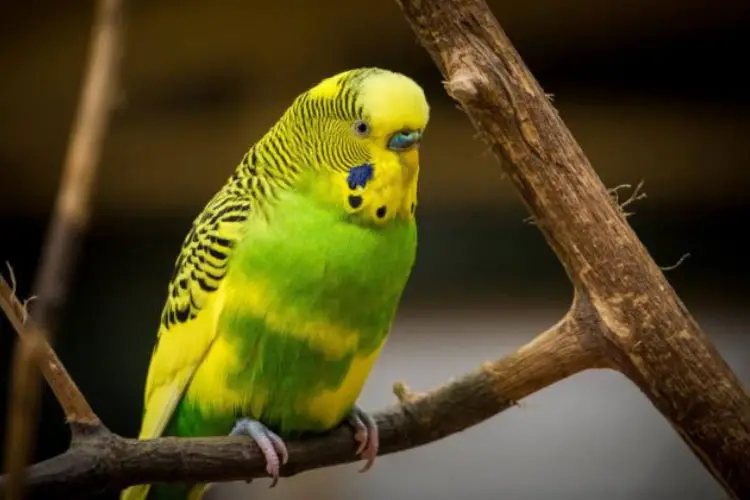Learning about your budgie’s body language could be fascinating. You must be excited to know why budgies bob their head up & down, flap their wings, hang upside down, or ruffle their feathers. Instead of investigating all these behaviors at once, we’ll have an in-depth look at the first one mentioned here.
Why does budgie bob their head up and down? They could be doing it for many reasons, such as hunger, mating, anger, excitement, boredom, territorial aggression, and seeking attention from the owner. This quirky mannerism of moving the head up and down is entertaining. And there’s nothing to be concerned about.
But since your budgie may be trying to send you a message, learning about all the details of this behavior is essential. Check them out in the article here.
Why Budgies Bob Their Head Up & Down?
Head bobbing is seen in almost every age group and sex of budgies. However, adult male budgies and baby budgies do it the most. Since this behavior can have different meanings, let’s look at the possible ones.
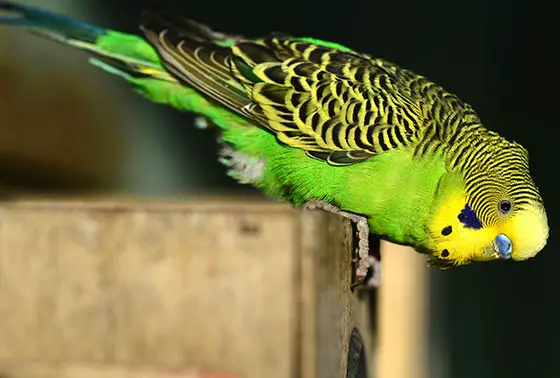
Hungry
Both baby and adult budgies bob their heads up and down when hungry. According to Johanna Black from the EcoTarium in Massachusetts, the young birds often bob their heads this way to ask their parents to feed them.
Many adult birds also bob their heads up and down to grab the owner’s attention when hungry. This behavior is often backed up with chirrups indicating, “give me food”! So check out the food tray of your beloved bird and fill it immediately if it’s empty.
Attracting a Mate
If you’ve got a male budgie eligible for mating, you could probably see him moving his head up and down alongside a dance performance that can attract the nearby female budgies. This courtship ritual is mainly seen when the male and female budgies are kept in separate cages. If you’re okay with welcoming new chicks into your family, you can keep both the male & female budgies together!
Showing Entertainment & Grabbing Attention
Budgies love getting attention from their owners. They think bobbing their head up and down can entertain their owners and give them much-desired attention. You’ll see the cheery and outgoing ones mostly doing head-bobbing. They also do that while dancing to some music to make the atmosphere merrier.
Showing Territorial Aggression
Like most birds, budgies are also territorial, especially females. The head-bobbing gesture is an expression of their lordship for the particular area and a way to warn others about their territory. Other birds understand this behavior and mostly avoid confronting a head-bobbing budgie.
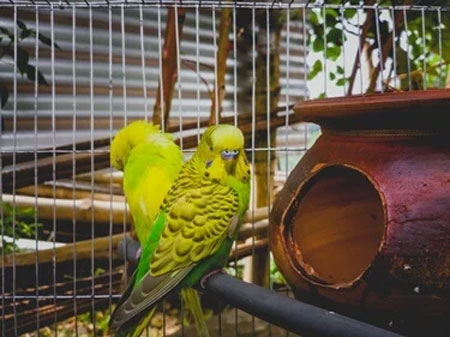
Boredom
One of the common reasons to see budgie’s head bobbing up and down is their boredom. If they stay alone for longer, they may move their head up and down to eliminate boredom. So you shouldn’t leave them without interaction for too long as it can bore and make them stressed.
Excitement or Anger
There are some more emotional reasons your budgie is bobbing the head. According to Stephanie Edlund, an IAABC Parrot Division Chair expert, head bobbing can also signify that your budgie is excited. She says the budgie gets excited during playing, after seeing any retreat, or before feeding. They also bob heads when they stand in front of a mirror which excites them, thinking there’s another budgie to play with.
She also addresses this gesture as a courtship behavior for budgies, who are seen to do that while regurgitating. However, she also adds anger as another reason your budgie may be bobbing the head up and down.
Is Budgie Head Bobbing Completely Normal?
Head bobbing is absolutely fine in most cases. Many healthy budgies do it when they’re hungry or looking for mating. They also do it when they’re happy and seeking more attention from their owners. Baby budgies bob their head and cry to get some food and nourishment for the parent birds. They’re also seen to do that while they’re learning to fly. So this is a perfectly healthy gesture for all-age-group budgies unless there’s no other symptom of illness.
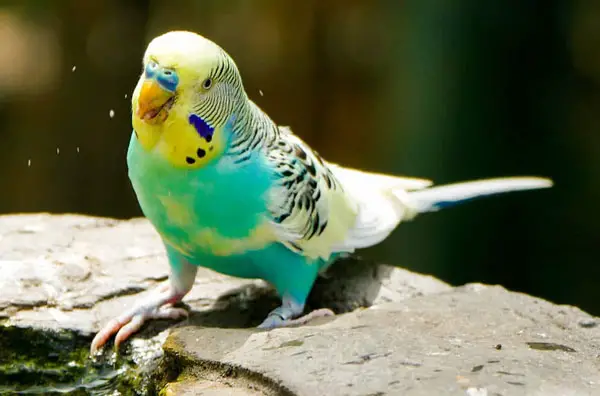
Also read: Do Budgies Bite?
Can Illness Cause Head-Bobbing?
Yes, there’s also a dark side to budgies’ head bobbing. You might see your budgie nodding the head inappropriately and at inappropriate times. So there could be caveats and underlying medical conditions causing your bird to do so.
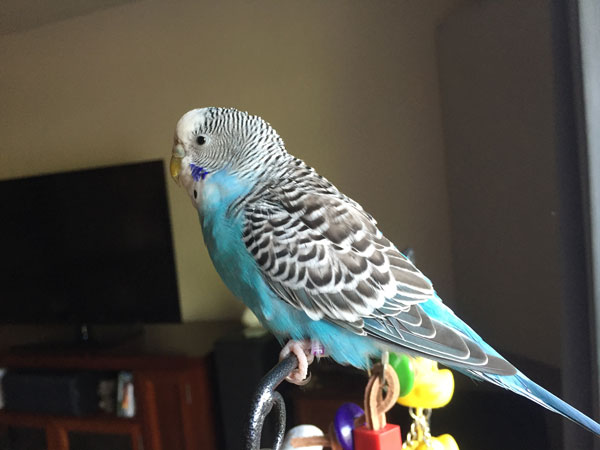
You should be able to differentiate it from regular head bobbing as they’re generally associated with other health issues like fever. It can happen due to parasitic infections that can interfere with the nervous system of your budgie and lead to some form of mental disease. But again, it’s rare, and head-bobbing is typically a behavior of healthy budgies.
What Should You Do When Budgie Bobs Head Up & Down?
We’ve listed how you should respond to the head-bobbing of your budgies after decoding its particular meaning. Check them out below.
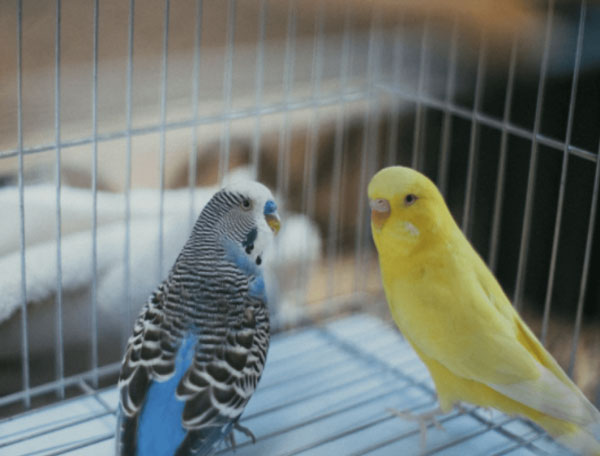
- Provide food if your budgie or the baby budgie is bobbing head due to hunger. Give them surprises with some occasional treats.
- Since head-bobbing is a sign that your budgie is looking for mating, allow him for courtship with an opposite-sex budgie. But you’ve to be ready to welcome new chicks.
- If your budgie is feeling bored, spend some quality time with him. Try to teach him how to speak. Give some toys when you’re not around. Make sure they’re not bored for a long time.
- If the budgie is bobbing its head out of aggression, excitement, or anger, try to calm them down. Interact with them and see if there’s anything that’s troubling them.
FAQs
Here we’ve got the answers to some more FAQs. Check them out below.
Head bobbing is a common trait of male budgies for courtship, but the females also do it occasionally, especially when they’re hungry, bored, or excited.
More commonly, budgies tilt their head to one side to better view the object they’re looking at. They can’t use their eyes to navigate things, so they nod their heads to stabilize the visuals.
Related: Why Does My Budgie Keep Facing the Wall?
Final Words
You always have to be observant and understand what your bird’s trying to say. When budgies bob their heads up and down, they generally have a message to pass on to their owners. They may be hungry or want your attention to play with them. They can also do that to tell you what they’re excited or angry about. Or, they could simply do it as a form of entertainment.
Moreover, head-bobbing could be a courtship behavior that can create a cute budgie couple and lead to offspring only if you allow it. So there’s nothing to be concerned about under normal circumstances. Only make sure it’s not associated with other symptoms of illness because that could worry you!
